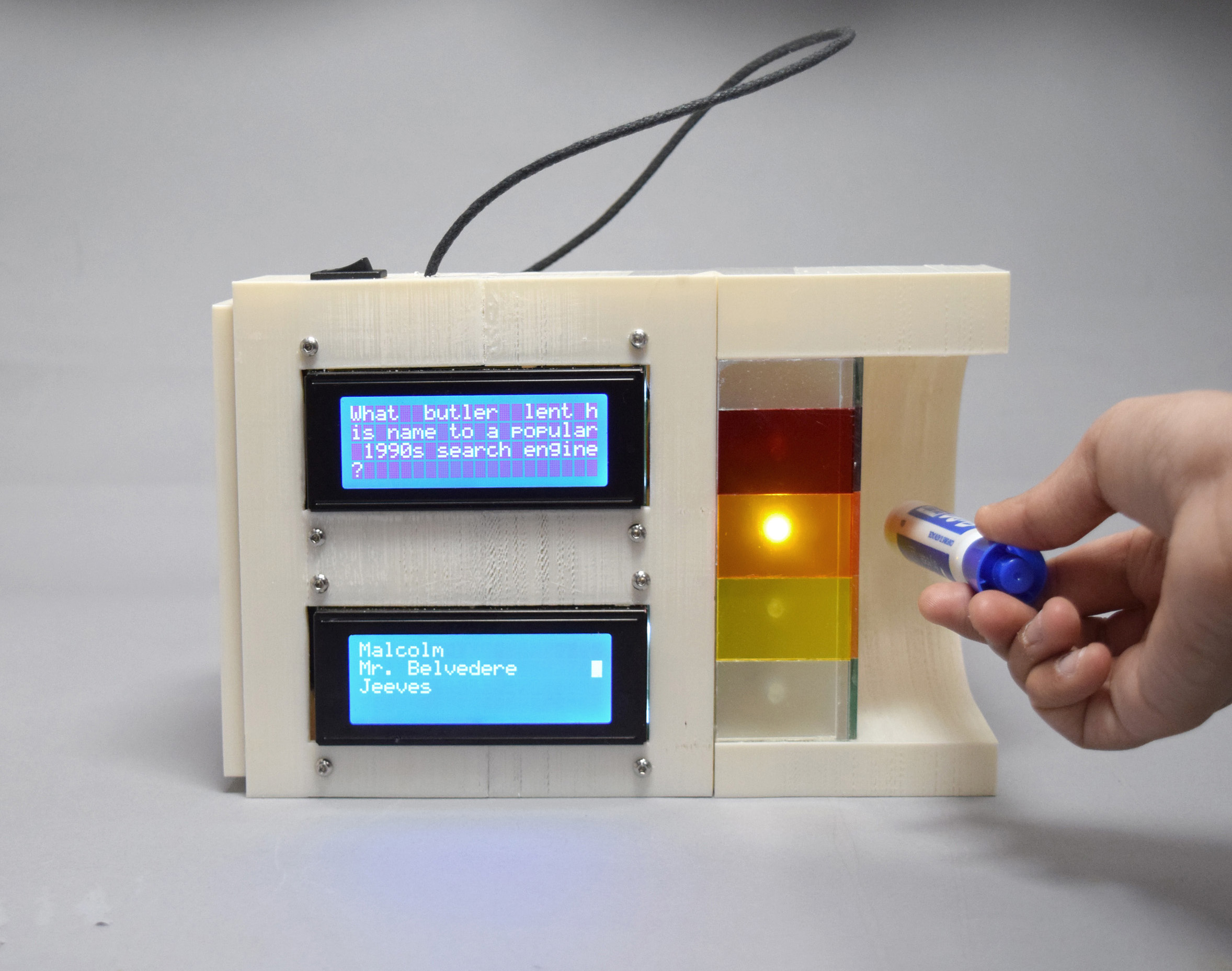Introduction to Physical Computing (60-223) is a 10-credit semester project-based course offered at Carnegie Mellon University by the School of Art under the auspices of IDeATe.
Class meetings for the second half of the semester will be conducted on the same schedule as usual (9:30–11:20 a.m. Pittsburgh time, Mondays and Wednesdays) via Zoom meeting; please see the class Canvas site for the link.

Trivia Machine by Team Enid (a final project from spring 2019)
Instructor: Robert Zacharias, rzachari@andrew.cmu.education (minus the cation)
TA: Harshine Visvanathan, hvisvana@andrew.cmu.education (minus the cation)
Class meetings: Mondays and Wednesdays, 9:30–11:20 a.m., room A10 in Hunt Library (IDeATe’s Physical Computing Lab)
Lab hours
- RZ: Mondays 4:30–5:30 p.m., and Wednesdays 11:30 a.m.–12:30 p.m.
- or by appointment with RZ; email to request a meeting at another time
- HV: Fridays 4:00–6:00 p.m.
Course synopsis
The first half of this practical project-based course is spent covering the basic technical skills (including electronics, programming, and hardware) needed to build simple interactive objects with embedded behavior using the Arduino microcontroller. Inputs to read information about the world include sensors such as an ultrasonic ranger, thermometer, light sensor, and human inputs like buttons and knobs. Outputs to affect the world include actuators such as motors, LED lights, speakers, and haptic feedback devices. Individual and group projects challenge students to apply their technical skills in creative ways. The class will be working with a local group of older people who serve as design clients for the final project; students conjure and build functioning assistive devices of a practical or whimsical nature for their critique and feedback. Readings and guest speakers address topics pertaining to design for older clients.
Topic and assignment schedule
| Monday | Wednesday |
|---|---|
| Jan. 13th introductions Arduino board tour Homework 1: Intro assigned |
Jan. 15th due: Homework 1 schematics and circuits Homework 2: Blinky Party assigned |
| Jan. 20th no class: Birthday of Martin Luther King, Jr. |
Jan. 22nd due: Homework 2 I = V/Rpotentiometers and buttons as inputs more Serial feedbackHomework 3: Blinking Machine for PitTraCo assigned |
| Jan. 27th due: Homework 3 IDeATe walking tour photoresistor and voltage divider Homework 4: Nightlights assigned |
Jan. 29th due: Homework 4 servo motor data types ultrasonic ranger accelerometer Project 1 introduced |
| Feb. 3rd due: Project 1 ideation analogWrite |
Feb. 5th external power Project 1 work |
| Feb. 10th Project 1 work |
Feb. 12th due: Project 1 |
| Feb. 17th Project 2 introduced DSLR photography Fritzing software |
Feb. 19th due (2/21): Project 2 Brainstorming sketches and notes CAD in Fusion 360 lasercutting at IDeATe |
| Feb. 24th non-blocking routines Project 2 work time |
Feb. 26th due: Project 2 Prototype |
| Mar. 2nd Project 2 work day |
Mar. 4th due: Project 2 |
| Mar. 9th spring break |
|
| Mar. 16th class cancelled make-up day is April 17th |
Mar. 18th introduction to virtual class using Tinkercad Circuits Homework 5 assigned due: Project 2 documentation (see note on due date flexibility, updated 3/15) |
| Mar. 23rd Final project introduced interview preparation and discussion final groups announced Osher partners picked by lottery |
Mar. 25th class dismisses at 10 a.m. to allow time for interviews if needed due: Homework 5 (flexible deadline) |
| Mar. 30th due: Final project ideation sketches team meetings: post-interview ideation review Prototype decisionmaking |
Apr. 1st due: Interview documentation Prototype work day In-person prototyping assigned over weekend |
| Apr. 6th Final project prototype presentation and crit with Osher students |
Apr. 8th debrief prototype session begin final ideation process |
| Apr. 13th due: Final project work plan due: Prototype documentation guest speaker gerontologist Laura Poskin, MPSG |
Apr. 15th final work day 1 Friday, Apr. 17th: office-hours-as-class |
| Apr. 20th final work day 2 |
Apr. 22nd final work day 3 |
| Apr. 27th Final project critique part 1 with Osher students and invited guests |
Apr. 29th Final project critique part 2 with Osher students and invited guests |
| Friday May 8th due: Final project documentation |
Monday May 11th final due date for all oustanding course work |
